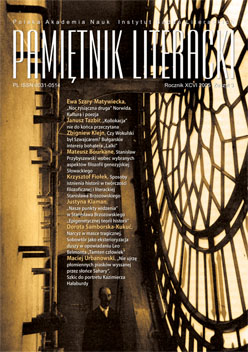Ocalony w gmachu wiersza. Człowiek wobec Historii w „Atlantydzie” Stanisława Barańczaka
Saved in the Edifice of the Poem: Man and History in Stanisław Barańczak’s “Atlantyda” (“Atlantis”)
Author(s): Jerzy KandzioraSubject(s): Literary Texts
Published by: Instytut Badań Literackich Polskiej Akademii Nauk
Keywords: S.Barańczak; “Atlantis”
Summary/Abstract: Stanisław Barańczak’s poems of the years 1981–1985 are a record of the experience of the poet, who after December 13, 1981 became an “involuntary emigrant” in the USA, and it is from this perspective that he observes the changes of the History in the country under the martial law. The article refers to three important poems of the “Atlantyda” (“Atlantis”) collection and to the three kinds of relations between the History and Man: parallelism between the break-up of the childhood utopia and the ideological utopia (“Historia” <“History”>), confrontation with the History that destroys a man (“Grażynie” <“To Grażyna”>) and mediation between an individual and a common celebration that enslaves it (“Msza za Polskę w St. Paul’s Church, grudzień 1984” <“A Mass for Poland in St. Paul’s Church, December 1984”>). The degree of the sense of the History’s oppression varies in the poems, but all of them are linked by unwillingness to read this sense in the romantic codes as collective and cyclic stories. This point is also reflected in the change of Barańczak’s poetics favoring an individual point of view and an intensive recording of the world, and encouraging to a symbolic and multi-layer reading.
Journal: Pamiętnik Literacki. Czasopismo kwartalne poświęcone historii i krytyce literatury polskiej
- Issue Year: 2005
- Issue No: 3
- Page Range: 155-180
- Page Count: 26
- Language: Polish

